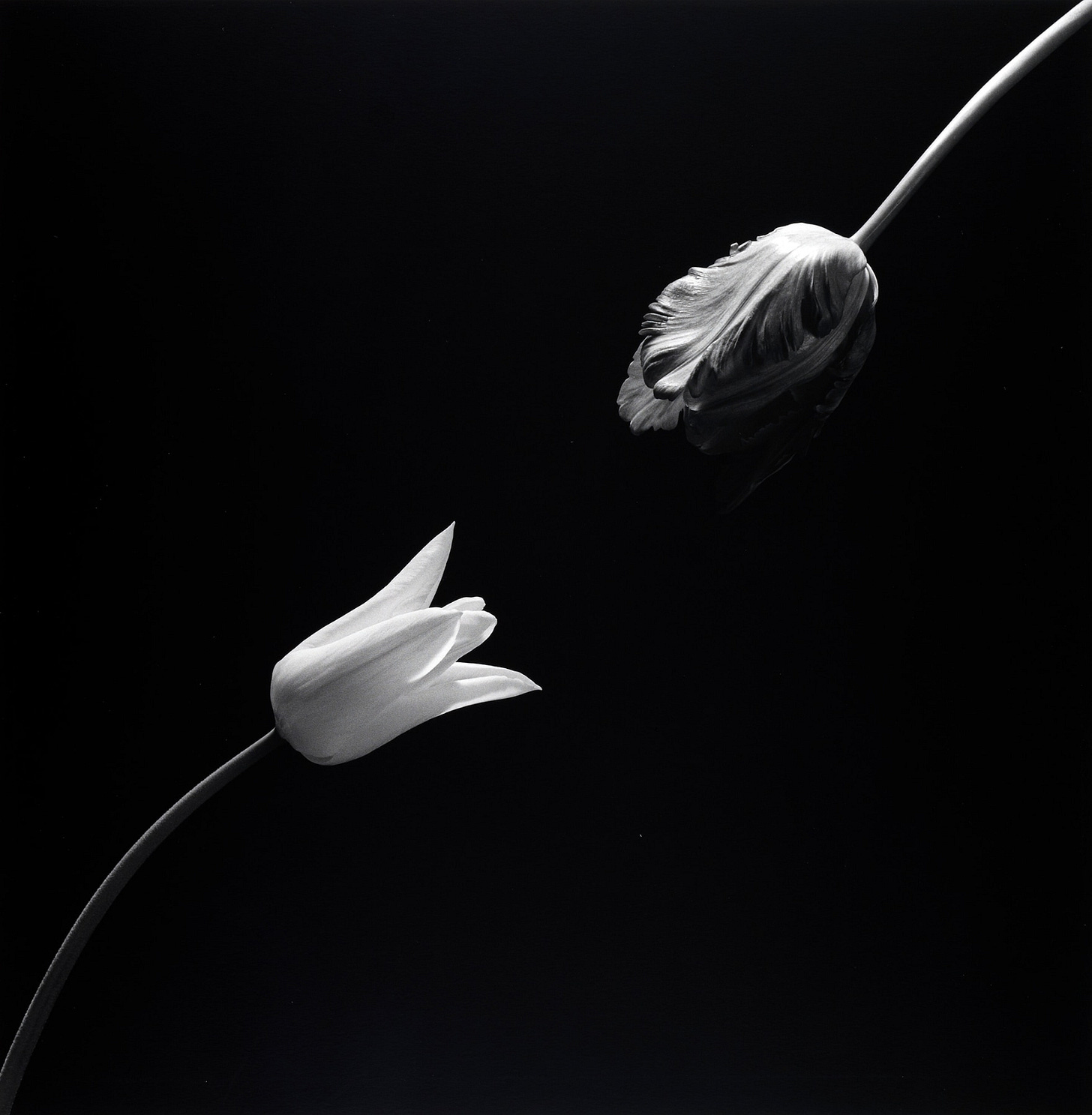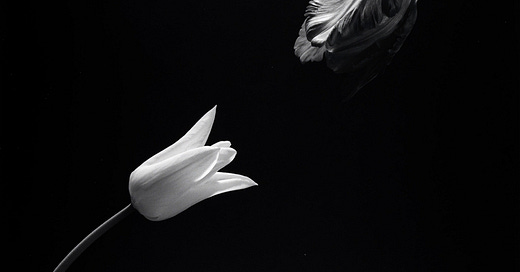Theme & Variations / Love
Three melancholy moments of music that convey love's power to restore, transform, and purify.

How does one begin to write about love (or write about music about love) when there are so many manifestations to consider? Even in our violent age of anxiety and division, we bear witness every day to countless acts of love — from a friend picking up groceries for their elderly neighbor to a wife holding her spouse's trembling hand before going into surgery. Each of these gestures, simultaneously quotidian and grand in their beauty, causes our souls to shimmer for one holy moment.
To help us explore a few of the ways classical music composers have embedded profound professions of love within their scores, I needed some guideposts. Focus on sacred love? I could offer a dayslong list of Bach's transcendent choral works. Obsessive love? Too easy — just close your eyes and point to almost any 19th-century opera for a good place to start.
Thanks to some wise words from Haper Lee I recently discovered, I realized I had been overthinking the matter. "There is only one kind of love — love," she wrote in a Vogue essay in 1961.
Lee's captivating exploration of the meaning of love, "Love — In Other Words," not only got me out of my own head, but also provided me with a North Star to guide our musical journey. Meditating on sources as varied as the gospels of Saint Paul and Cervantes's Don Quixote, Lee ultimately defines love — that "direct action of mind and body" — by its ability to restore, transform, and purify.
With those guideposts now in place, let's dive into the latest installment of our Theme & Variations series. Here are three moments of melancholy music that embody those aspects of love Lee so magnificently names — each paired with the essay extract that inspired its selection.
Sergei Prokofiev / "Juliet's Death," from Romeo and Juliet
Love restores
"As one holds down a cork to the bottom of a stream, so may love be imprisoned by self: Remove self, and love rises to the surface of man's being."
The world surrounding Romeo Montague and Juliet Capulet is not a kind one: violence rules their city, a bitter feud sparks constant conflict between their families, and Juliet is about to be sold into marriage for political gains. Love in fair Verona, where Shakespeare and Prokofiev lay their scenes, is nothing but a subservient pawn of authority.
The blossoming of love liberates the star-crossed teenagers from the emotional prison of their families' making, their newfound freedom brought to life in spectacular fashion throughout Prokofiev's lush ballet score. While many would point to the ballet's famous balcony scene and its adrenaline rush of joy as the prime example of this liberation — it's in the lovers' deaths that Prokofiev's music offers them immortality.
After Juliet's funeral procession and Romeo's suicide — the pathos of these scenes magnified by wailing trombones and violent drum strokes — Prokofiev establishes a different tone for Juliet's death. The simple, folk-like melody that has represented her throughout the ballet shivers quietly in the violins, a spectral echo of the life that was, before ceremonial chords in the trombone and tuba call for silence.
And then — restoration. Juliet's theme returns over a bed of glowing brass, this time soaring magnificently in the strings, which ascend ever higher as celestial harp and woodwind choirs glisten through the orchestral texture. This isn't music of tragedy and loss, but love and redemption. Prokofiev closes his ballet with an apotheosis for Romeo and Juliet, transporting their earthly love into the realm of the divine, the eternal.
Kaija Saariaho / L'Amour de loin (Love from Afar)
Love transforms
"Every creation of man's mind that has withstood the buffeting of time was born of love—love of something or someone."
Although the music of Kaija Saariaho's first opera, L'Amour de loin, swims in a vast ocean of emotions — where we encounter love and mourning, nostalgia and fulfillment, obsession and devotion — its story, penned by the Lebanese writer Amin Maalouf, is remarkably focused.
At the center of the plot is Jaufré Rudel, a troubadour and the Prince of Blaye in 12th-century Aquitaine. Having renounced his riches and the earthly pleasures of his youth, he sings a song of longing for an idealized, "distant love." Jaufré believes such love to be unattainable — until he encounters a mysterious traveler known only as the Pilgrim, who tells the prince the object of his love does exist. Her name is Clemence, the Countess of Tripoli, a far-off land cloaked with ''oceans of sand'' and ''rivers of ash."
Eager to sing his songs of love to Clemence, Jaufré embarks on a stormy, harrowing journey by sea to Tripoli. He's taken ill during the voyage and is near to death when his ship arrives on the city's shores. Moments after meeting Clemence, Jaufré dies in her arms, sending the countess into a spiral of grief. She enters a convent in the opera's final scene, where she declares to God:
My prayer rises to you so far from me now, Towards you so far away. … Lord, you are love Now you are the distant love ...
Every bar of Saariaho's score mesmerizes, its undulating, cavernous textures of gossamer bells, floating strings, and mournful brass mirroring the chasms that lie between Jaufré and Clemence. But in Jaufré's song of devotion to his distant love, the voice is largely isolated from the orchestra, which seems to be enchanted into silence by the opening lines of Jaufré's melancholy poetry:
Never shall I delight in love If I delight not in this distant love, For a nobler nor a better love I know not of … Wheresoever, neither near, nor far.
The ache of his isolation, the resolution of his desire to be one with this distant love reaches feverish intensity in every recitation of loin (afar). Each time, Jaufré's voice slightly rises in pitch, like a choking back of tears, an agony he's unable to overcome at the end of each breath. Considering himself unworthy of ever experiencing that love, the troubadour finds consolation only by believing in love's fulfillment — and expressing that belief in his songs.
Follow along with the French text and English translation.
Peter Lieberson / "Amor mio, si muero y tu no mueres" (My love, if I die and you don't), from Neruda Songs
Love purifies
"Love, unlike virtue, is not its own reward. The reward of love is peace of mind, and peace of mind is the end of man's desiring."
Pablo Neruda's Love Sonnets came into Peter Lieberson's life in fortuitous fashion in the summer of 1997. Not because he was drawn to purchase a book of these poems at the airport in Albuquerque, New Mexico, of all places — but because just weeks before, he had fallen deeply in love.
While at Santa Fe Opera for the premiere of his opera Ashoka's Dream, Peter, a composer known for his thorny atonal style, had met the mezzo-soprano Lorraine Hunt, revered for her visceral performances of Baroque music, especially Bach and Handel. The two quickly became central to each other's life, and after many nights reading Neruda's poems to each other in bed, Peter knew he needed to set them to music for Lorraine.
That opportunity came just a few years later, when three U.S. orchestras collectively commissioned Peter to write a new composition. Thrilled to finally have the space to embark on this profession of love for his wife, he began work on his Neruda Songs. But by the time of the work's premiere in late 2005, life had drastically changed for the Liebersons. Lorraine had been diagnosed with breast cancer.
Although she had reduced her concert schedule due to ongoing treatment, Lorraine performed her husband's songs three times in the months before her death in 2006 — including one with the Boston Symphony so moving that Boston Globe critic Richard Dyer wrote how "time itself stopped to listen."
Peter noted that the five Neruda poems he set each "reflect a different face in love's mirror." And in the last, Sonnet XCII, the face we encounter is one of consolation. Over gently rocking strings, the voice begins to sing:
My love, if I die and you don't let's not give grief an even greater field. No expanse is greater than where we live.
The poem is awash in comforting visions — those little infinities we experience when we give and receive love in equal measure — evoked so tenderly, so liltingly by Lorraine, like a lullaby dancing a waltz with a torch song. After the poem's final line, a declaration of love's immortality, she echoes amor (love) three times, each one soaring higher as the music dissolves into silence.
These songs gave Peter more than just an outlet for showcasing the honey-toned voice of his wife and muse — they also offered him a path for healing, for cultivating the peace of mind needed to continue living after enduring such loss. A few weeks after Lorraine's death, he wrote:
"After I heard these pieces and the way she sang them, there was a sense of completion. A sense that I finally had done what I really wanted to do and I was able to express my love for Lorraine in music. ... I loved Lorraine completely and I have never felt so completely loved. And now, my love, my love, I remind myself again and again that 'this love has not ended ... it is like a long river, only changing lands and changing lips.'"
Follow along with the Spanish text and English translation.
What was your experience listening to these works? I want to know! Be sure to drop a comment below or simply reply to this email. (And if you enjoyed your time here today, would you ever so kindly tap that little heart below? 👇🏼)
Thank you for reading Shades of Blue! This newsletter is free, but paid subscribers help support the 20+ hours of research, writing, editing, and production that goes into every essay. If you look forward to reading Shades of Blue, please consider becoming a paid subscriber …
… or make a one-time donation through Buy Me a Coffee:







Another marvellous selection, including the Mapplethorpe at the beginning!
Dear me, the story of the Liebersons is so very touching, and what a wonderful memorial to Lorraine they created together. Deeply moving.
I enjoyed the Saariaho very much.
I especially loved the third one
My love, if I die and you don't
let's not give grief an even greater field.
No expanse is greater than where we live.
The music very tender and beautiful.